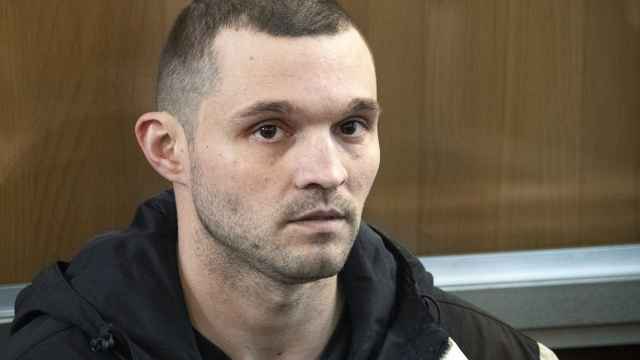The Russian arms dealer sentenced to 25 years in an American prison will be on the agenda for upcoming talks between the two countries.
Foreign Minister Sergei Lavrov will bring up the Viktor Bout case with counterpart Hillary Clinton during his visit to Washington, which starts Wednesday.
“For sure, Bout is a topic that is regularly addressed in our contacts with the Americans,” Lavrov said Friday while answering reporters’ questions.
“Bout was presented to the judge and jury like a person who was already a criminal,” Lavrov said. “It was described in a way that made it seem like a done deal, and that, of course, influenced the trial.”
The foreign minister is the first senior government official to speak about the case since Bout’s sentencing Thursday in New York.
Lavrov said the Russian government would actively support Bout’s appeal.
An analyst at the IMEMO Institute of World Economy and International Relations, a government think tank, said Bout’s case put Russia in a “U.S. trap.”
The analyst spoke on condition of anonymity due to the sensitivity of the issue.
“If Russia works to find ways to release Bout, [those efforts] would underscore how important he is. If it does not, it would lose face because everyone everywhere understands that this business remains under state protection, and the country shows its inability” if it doesn’t stand up for Bout.
Following Lavrov’s statement, senior foreign policy officials said the Russian government will try hard to negotiate Bout’s release and seek to extradite him so he can serve his sentence in his home country.
One analyst said Bout would not serve many years behind bars if he were transferred to Russian custody.
“The Bout sentencing is causing friction. The U.S. knows that holding Bout is akin to holding a cat by its tail, but this cat knows too much to be traded away easily," said Theodor Karasik, a senior expert with the INEGMA think tank in Dubai.
"A key question is what could Moscow offer to the U.S. in exchange for Bout serving his sentence out in Russia. I don’t think there is a clear answer, because if Bout were sent back to Russia he would be in prison for very little time," Karasik said.
A former military translator who operated a fleet of Soviet-made planes, Bout was sentenced for convictions on four conspiracy charges relating to his support of a Colombian terrorist organization.
Bout was arrested in Thailand by U.S. Drug Enforcement Administration agents posing as members of a terrorist group. He then was extradited to the United States for trial in 2010.
Prosecutors requested a life sentence, saying Bout was ready to sell the agents up to $25 millions in weapons, including surface-to-air missiles to shoot U.S. helicopters fighting the drug-trading rebels.
But U.S. District Judge Shira Scheindlin ruled that a 25-year sentence was sufficient because she saw no evidence that Bout intended to harm Americans.
Bout will serve 21 years of his sentence, since he has already spent four years in U.S. custody. All his property, valued at about $15 million, will be confiscated.
From his prison cell, Bout called the case against him a “lie.”
He also invoked a line from a patriotic song about the Varyag, a cruiser destroyed by the Japanese navy in 1905.
“The proud Varyag is not surrendering to the enemies,” Bout said, Russian media reported.
Russian media outlets have speculated that Bout might have been involved in the arms trade with the blessing of senior officials.
Deputy Prime Minister Igor Sechin has been mentioned as one of the government officials acquainted with Bout.
Bout has denied ties to Sechin but said he “would be glad to meet with him.”
“I would be glad to get support from any Russian politician who would be interested in the fate of a Russian citizen,” Bout said in one of his earlier interviews.
Speaking to state-owned Voice of Russia radio station, Bout’s wife, Alla, called the sentence a “small victory” for her husband.
“The sentence of 25 years allows the possibility for [early] release,” said Sergei Markov, a professor and vice president of the Plekhanov Institute of Economics.
Russian officials said they would seek legal ways to extradite Bout. The Justice Ministry said Friday that Bout might be released to Russian custody using a convention signed by both the United States and Russia.
Although that document was signed in 1983, it has been used only once. In 2008, U.S. authorities released a former senior UN official and Russian citizen, Vladimir Kuznetsov, who had been convicted of money laundering and spent one year of his four-year prison term in the United States.
The case of Bout creates a negative background for the Russian-American relationship, said Alexei Pushkov, head of the State Duma’s International Affairs Committee.
“The relationship-improvement ball is in the United States’ court,” Pushkov said, RIA-Novosti reported.
Pushkov sees parallels between Bout’s prosecution and the case of Edmond Pope, an American businessman and former intelligence officer accused of trying to purchase classified technical documents regarding a Russian torpedo.
Pope received a 20-year prison sentence but was released by then-President Vladimir Putin in December 2000.
Pope spent several months in pretrial detention after his arrest in April 2000.
“Now we have the possibility to see how President Obama’s administration will act in this case,” Pushkov said.
Alexei Mukhin, an analyst at the Center for Political Information, said Russia’s extradition request could be granted, since public interest in the “Hollywood movie” aspect of the case has subsided.
Markov said it is hard to tell whether Bout’s sentence will be raised during the presidential meeting at Camp David, scheduled for May.
But he said the topic might be broached by security agencies of both countries.
“All countries use arms traders,” Markov said. “But there are silent rules of the game, and Americans have violated those rules to show that they are the only ones who can do it.”
A Message from The Moscow Times:
Dear readers,
We are facing unprecedented challenges. Russia's Prosecutor General's Office has designated The Moscow Times as an "undesirable" organization, criminalizing our work and putting our staff at risk of prosecution. This follows our earlier unjust labeling as a "foreign agent."
These actions are direct attempts to silence independent journalism in Russia. The authorities claim our work "discredits the decisions of the Russian leadership." We see things differently: we strive to provide accurate, unbiased reporting on Russia.
We, the journalists of The Moscow Times, refuse to be silenced. But to continue our work, we need your help.
Your support, no matter how small, makes a world of difference. If you can, please support us monthly starting from just $2. It's quick to set up, and every contribution makes a significant impact.
By supporting The Moscow Times, you're defending open, independent journalism in the face of repression. Thank you for standing with us.
Remind me later.





